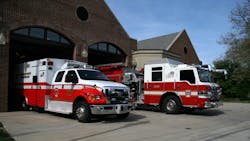Aggressive Recruitment Needed as OH FDs Facing Shortage
CLEVELAND, Ohio – For years, fire chiefs across Northeast Ohio have struggled to answer a daunting question: Why is it so hard to find people who want to be firefighters?
The number of candidates seeking jobs has dropped dramatically throughout the region, as it has across the country, officials say. The issue has prompted city officials to enhance their attempts to recruit, with some departments starting as early as high school to introduce students to the career.
But some chiefs cite what appears to be a shift away from public service. They believe the stress of the position, the chance of serious injury and the often-unpredictable hours have made the position less interesting to youths. The job is further complicated because many departments demand officers work as both emergency-medical technicians and firefighters, a dual role that requires two certifications.
“Our job involves a lot more than fighting fires,” Cleveland fire spokesman Lt. Michael Norman said.
But the departments across the region remain steadfast in maintaining high standards, despite the drop in numbers.
“We have seen a significant reduction,” said Dave Freeman, the chief of Cleveland Heights. “We used to have a cap on candidates at 100 [who applied for positions], even 10 years ago, and would have lines outside on the first day of the application [process]. For the past three tests, we had less than 50 applications each time.”
Mike Freeman, the assistant fire chief in Westlake, said his department also had to put caps on the number of applicants. That, however, has changed.
“We stopped taking applications at 200, and this was 10 years ago,” he said. “[Today] we have 36 candidates.”
Chiefs across Cuyahoga County said the issue has not hindered their abilities to fight fires. It has, however, worried them about a potential wave of future retirements. Such moves could limit staffing and require more dependence on mutual aid, where surrounding departments rush to fight emergencies.
In Middleburg Heights, the department is down a position because of a retirement. Briant Galgas, the fire chief, said he believes the drop in the numbers stems from the stress of a job that requires officers to work 48 hours at the station per week. Often, they are on call when they are away from the station.
In departments across the region, the stresses appear to have made an impact. Fewer candidates often mean fewer qualified job-seekers. Departments, however, say they refuse to lower their standards to boost candidates.
“We are not seeing anywhere [near] the number of candidates testing today that we have seen in the past; however, we are getting quality candidates to hire,” said Aaron Lenart, Rocky River’s chief.
“We have not lessened any of our requirements. We still require firefighter/paramedic certifications, still have police provide a stringent background process for each candidate and have the candidates clear a rigorous medical clearance.”
Recruiting tomorrow’s firefighters
The issue has prompted many departments to do something that was unheard of 20 years ago: recruiting young candidates with an emphasis on the benefits of serving a community.
“We need to better promote the satisfaction gained from serving others and the importance of those who make this a calling,” said Dave Freeman of Cleveland Heights.
“The hope is to recruit ‘homegrown’ talent at an early age,” said Christopher Haddock, the fire chief in Euclid.
In 2020, Euclid participated in a regional firefighter entrance examination, Haddock said. The civil service commissions of eight cities, including Euclid, joined and offered a written exam, he said.
That gave the cities an applicant pool of 143 men and women who passed the examination and became eligible for consideration.
Euclid and other cities have continued to work with students in high school, a move that offers an up-close view of a career. Euclid, for instance, initiated a fire academy several years ago in the city’s high school.
Cleveland Heights has a similar program. Each is an attempt to draw candidates. Berea Fire Chief Terry Ledwell said he has even discussed dropping the application fee to draw recruits.
For cities, the push to start earlier has never been more important. Many fire departments view it as a way to fight a trend in city hiring.
“This is not just happening in Euclid or Northeast Ohio,” he said. “It’s occurring all throughout the United States.”
©2022 Advance Local Media LLC. Visit cleveland.com. Distributed by Tribune Content Agency, LLC.
